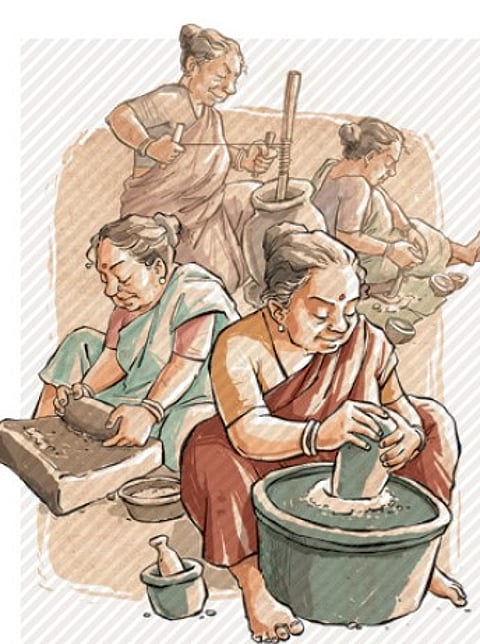

NEW DELHI: Indian women work ten times more than men on unpaid domestic chores and caregiving compared to their counterparts in other parts of the world, a study has revealed.
However, educated women are better placed in workload management, according to the research conducted by the International Institute for Population Sciences (IIPS), Mumbai, and Tata Institute of Social Sciences (TISS), Mumbai.
Confirming that married Indian women bear a disproportionate burden - almost double - of unpaid work compared to their unmarried counterparts, it said that women from upper-caste Hindu, Muslim, and Sikh women put in the most hours in unpaid domestic work.
“Women worldwide spend three times more time on unpaid domestic and care work than men, but in India, women spend almost ten times more time than men,” the study published in the Journal of Family and Economic Issues said.
It also pointed out that not only does the presence of school-age children increase the amount of time women spend on unpaid domestic work, but women living in a nuclear family, on average, have higher levels of unpaid work than those living in multigenerational households.
Highlighting the division of unpaid domestic work between men and women, irrespective of their age, the study said women aged six years and above spend 301 minutes on unpaid domestic work compared to men who devote a mere 98 minutes to the same.
Using the data from the Time Use Survey (2019) of India, which was conducted by the National Sample Survey Office (NSSO) in January-December 2019, the study said while natal parents are more supportive than in-laws, the education of parents and in-laws has a significant impact on unpaid domestic work.
Though unpaid domestic work of women reduces in female-predominant households, it increases in male-predominant households.
“Since unpaid tasks are hard to measure based on the market values, they are not counted as part of economic activity. However, if accounted for, their contribution to the economy is assumed to be around 10 to 60% of the GDP globally, which is substantial,” Balhasan Ali, the study's lead author, said.
Unpaid domestic work was defined as food and meals management and preparation, cleaning and maintaining own dwelling and surroundings, do-it-yourself decoration, maintenance and repair, care and maintenance of textiles and footwear, household management, pet care, shopping for household members, travelling, moving, transporting or accompanying goods or persons, etc.
“The time spent by women on unpaid domestic work peaks at the typically working age group of 20–49 years, which depicts Indian women’s productive and reproductive work-life imbalance, revealing a massive burden of unpaid work during reproductive age,” Ali from the Department of Survey Research and Data Analytics, IIPS, told The New Indian Express.
While urban women with no education are 86.7% more likely to spend time on unpaid domestic work than women in rural areas without any education.
Also, urban women with secondary education are almost thrice as likely to spend time on unpaid domestic work than their rural counterparts, according to the study conducted among 445,299 people - 226,644 men, 218,526 women, and 129 others.
The burden on women from smaller households (those with four or fewer members) is more significant (320 min per day) than women living with bigger families (303 minutes per day).
As expected, the women from poorer households spend more time on unpaid domestic work (317 minutes per day) than women from the wealthiest households (304 minutes per day), it said, adding that it could be because those from more affluent families have the means to outsource their unpaid domestic work to others by hiring house help.
It also said that Scheduled Caste (5%), Other Backward Caste (2%), and general caste (4%) women spend significantly more time on unpaid domestic chores than Scheduled Tribe women. The main reason ST women are less engaged with unpaid work is because they devote more time to paid work as evident in periodic labour force surveys.
“While the average time spent by working-age women varies according to their socio-economic and household characteristics, it is clear that women have a massive burden of unpaid work,” Ali said.